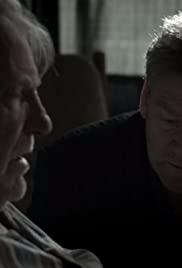
WALLANDER: THE FIFTH WOMAN
UK/Sweden, 2009, 90 minutes, Colour.
Kenneth Branagh, Saskia Reeves, Jeany Spark, David Warner, Polly Hemingway, Tom Hiddleston, Richard Mc Cabe, Phyllis Logan.
Directed by Aisling Walsh.
Wallander: The Fifth Woman is the third in the second series of Wallander stories made by Kenneth Branagh. As with the others, it was adapted by Richard Cottan from a novel by Henning Mankell. The director is Aisling Walsh, director of such films as A Song for a Raggy Boy, The Daisy Chain.
The film focuses on a murder mystery, several murders and explores the themes, the connections between the victims, finally unravelling the solution. However, the film, as with the previous films, focuses also on the relationship between Wallander and his father, played by David Warner. In this film, his father finally succumbs to illness and dies, something which Wallander finds very difficult to accept. The screenplay weaves this theme of grief at death into the solution of the murder mystery where a woman, overcome by her mother’s death from cancer, wreaks havoc on abusive men, information she had received from presiding over a women’s discussion group about abuse.
The film has a strong Swedish setting, has a strong cast, especially those regulars in the staff as well as Saskia Reeves as the secretary of one of the victims.
1. The adaptation of the novel? The murder mystery, the characters, situations? Wallander’s personal life, his father?
2. The Swedish settings, the town, the sea, institutions? Musical score?
3. The titles and expectations?
4. The focus on Wallander’s father, in hospital, asking his son to take him home. Sitting to watch the sea, telling his son to stop and look at life? His death, sitting in the chair, Wallander shaking him in disbelief? The ambulance?
5. The initial crime, the old man, the bird-watching, Wallander delving into the information, inspecting the scene? The victim and his books, the dedication to Krista, the bird poems? His finally being with the birds, the torture, the flocks flying over? Suffering a great deal of pain? His background as a car dealer? The second victim, kept in a cell, blindfold, given something to drink, taken into the forest, killed? Florist, his love for orchids, the break-in? The bloodstains? The body found? His assistant, identifying the body, revealed as his lover for a short time? His children and their lack of interest in him?
6. Searching for the interconnections between the deaths? Grief and old men? The sorting of the paintings, Gertrude looking after Pauvel,(**??) the funeral, Wallander’s wife coming, their meeting, Linda? The discussion about Wallander’s inner life and his soul, his father’s comments?
7. The florist and his son, the son’s resentment? The mother’s suicide? Vanja and her relationship? Feeling a burden lifted?
8. The man who delivered the oil, his extreme right views, saying that the victim was a thinking man? The information about his going to Poland for women?
9. The suitcase in the field, the photos, Vanja identifying it? The police meant to find it?
10. The woman observing the birth, the jogger and the chloroform, being put in the case, drowned, the finding of the corpse? The wife’s comment about the victim’s cruelty?
11. The familiar staff, Magnus, the women, the autopsies? Wallander and his outbursts? Their reactions?
12. The birth, Katerina, the midwife and her evidence? The press conference?
13. The information about the women’s group, the situations of abuse, Katerina, her contact with the older married man? Yvonne and her role? Wallander visiting the hall? The attraction towards Vanja, his father’s painting? The list of names?
14. The old man and his information, about the Polish Krista and her name?
15. The interview, the women talking about Yvonne? Krista and her death? The effect of the death on Yvonne, looking after Katerina and her baby?
16. The final victim at the station, Yvonne trying to push him, the confrontation with Wallander, shooting him, taking him as hostage, the melodramatic killing of herself?
17. The satisfactory explanation of what had gone on, the investigation? And the development in the character of Wallander?